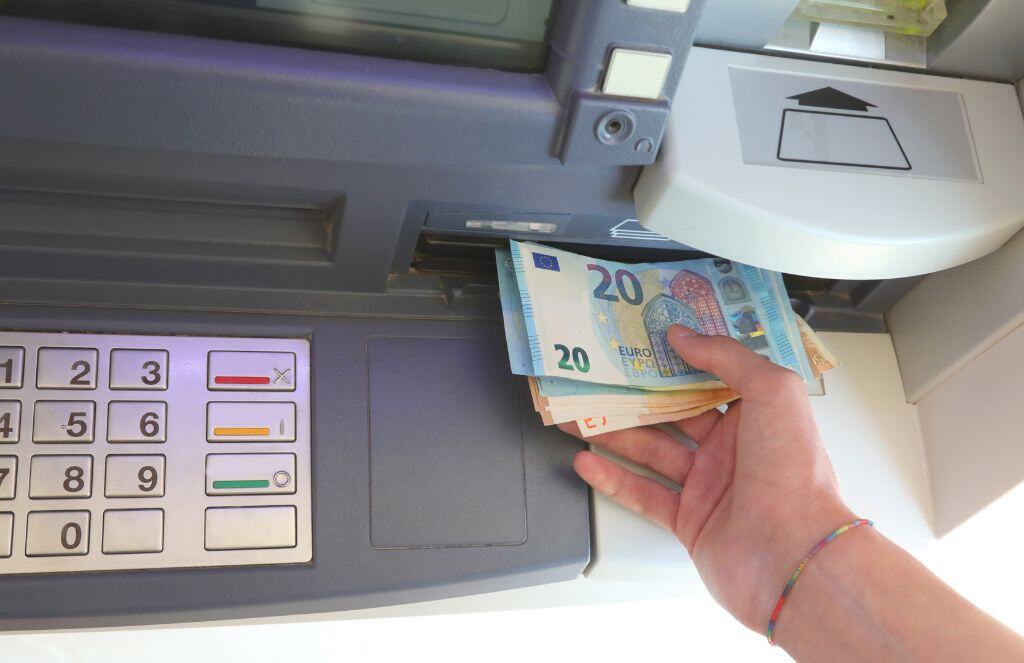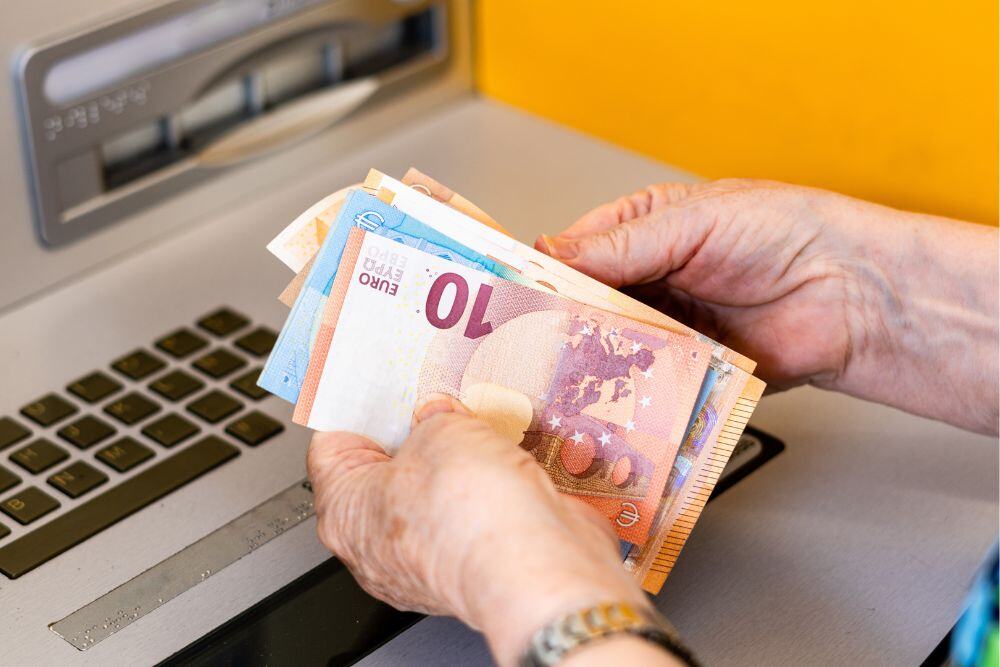How Much Spending Money for Greece?
Greece is steeped in history and culture, has deep mythological roots, and was home to some of the world's greatest philosophical minds. It is also one of the most beautiful places you can ever wish to visit, with crystal clear oceans and mountainous scenery. But just how much spending money should you take to Greece? Here at Crown Currency Exchange, we've made this easier to work out by providing you with a comprehensive breakdown of everything you need to budget for.
How Much Spending Money Do I Need for Greece?
Your budget for a trip to Greece will ultimately depend on your travel style. Here's what you can expect to spend across three different styles:
Budget Travellers
Those trying to stick to a tight budget will need to allocate around EUR €80 per day. This will allow you to stay in a nice hostel, shop for groceries at the local market, and enjoy Greece's street food. You'll also be able to get around cheaply using the widely available public transportation in Greece.
In terms of activities, budget travellers can visit the Epidaurus Theater and the Museum of Olive Oil for a really low entry fee. Not to mention, you can explore Greece's beautiful areas and town centres for free.
Mid-range Travellers
A daily budget of EUR €200 will allow mid-range travellers to book a comfortable Airbnb apartment or budget hotel room. This budget will also cover meals in restaurants as well as the occasional food stall, plus a good amount of groceries.
A car or scooter can be hired within this budget too, and you'll be able to enjoy some higher-end activities such as a tour of the Acropolis and the Delphi.
Luxury Travellers
Those with a taste for the finer things in life will need a daily budget of around EUR €400. This is enough to cover a luxury hotel room, dinner and drinks in some of Greece's fine dining restaurants, lunch at food stalls, and car rentals.
You'll also be able to indulge in some amazing activities with this budget as well, including a hiking tour of Mount Olympus with food and wine and spelunking at Melissani Cave.
What Goes into a Travel Budget?

While it can be all too easy to get lost in the excitement of planning a trip to Greece, there are important things you need to think about when planning your budget. These include:
- Food & Drink: Greek food is some of the best in the world, so you'll definitely want to factor this into your budget.
- Accommodation: From hostels to five-star luxury hotels, Greece has an accommodation option for everyone. But where you're able to stay will heavily depend on how much you can afford.
- Activities: As you'd expect from a country with an ancient past, there's plenty to see and do in Greece. There are also fun activities for thrill-seekers as well as family-friendly days out, each of which comes with its own price.
- Transportation: With Greece being a series of small islands, it's really important to think about how you're going to get around and, more importantly, how much it's going to cost.
To help make budgeting for each of the above easier, we've broken down each of the above categories in more detail, along with average prices.
What is the Cost of Accommodation in Greece?

The cost of accommodation in Greece varies quite significantly depending on what type of accommodation best suits your travel style, with hostels costing as little as EUR €15 per night and luxury hotels setting you back up to EUR €250 per night.
- Budget Travellers: Hostels in Greece are amongst the cheapest prices in Europe, and you can find a comfortable bed in a dorm room for EUR €15-€20.
- Mid-Range Travellers: For those who prefer a little more comfort and privacy, a room in an Airbnb will cost around EUR €75 per night. You can also bring your comfort levels up a notch by choosing a mid-range hotel room, which will cost an average of EUR €100 per night.
- Luxury Travellers: You can expect to spend around EUR €180-€250 per night in one of Greece's luxury hotels. However, the price will fluctuate depending on which part of Greece you're visiting and the time of year, with costs increasing significantly during the high season.
Different Accommodation Options:
- Hostels: Staying in a hostel is perfect if you're trying to keep as much money in your budget as possible for food, drink, and activities. The average hostel in Greece costs between EUR €15-€20 per night, but in the off-season, some hostels reduce prices to as little as EUR €11 per night.
- Rooms & Apartments: You can find rooms and whole apartments on Airbnb for around EUR €75-€100 per night. This is a great choice if you're looking for an inexpensive way of staying close to town or if you want to practice speaking Greek with a host family.
- Villas: For groups travelling together, it often works out cheaper to book an entire villa rather than individual hotel rooms. While it may seem bougie or excessive, a group of four people sharing a two-bedroom villa for a week can be as little as EUR €30 per person per night.
- Hotels: Solo travellers looking for comfort and privacy may want to choose a hotel room, which will cost anywhere between EUR €100-€250 per night, depending on whether you have a mid-range or luxury budget.
- Camping: To really save on your accommodation costs, you might want to consider camping in Greece as the average cost is between EUR €5-€10 per day! It is worth remembering, however, that you'll need to either bring your own tent, which may cost extra at the airport or rent a tent when you're in Greece, which will also come with an additional cost.
Our Money-Saving Tips for Accommodation Costs:
- Book Off-Season: Many places in Greece, even luxury hotels, reduce their prices massively during the quiet season (typically October to April), so booking accommodation in Greece during this time of year will save money in your budget for other things.
- Choose All-Inclusive: There's a bit of a cheat to be had with all-inclusive holidays. While they may seem more expensive to begin with, you can save money by eating, drinking, and enjoying certain activities at the hotel without having to pay for any supplements, saving the need to budget elsewhere in the process.
What is the Cost of Food in Greece?

You can't visit Greece without sampling some of the amazing foods on offer, including Gyros, moussaka, feta, and baklava. Here are the average food prices depending on where you want to eat:
- Street Food: You can find some incredible street food in Greece, including stalls selling local food such as souvlaki, kebabs, gyros, tiropita, and spanakopita. The average price per dish at Greece's street food stall is EUR €3.50, so this is a great way to get a meal for cheap while still experiencing some of Greece's traditional cuisine. Just make sure you choose wisely, as some stalls may not have the best hygiene standards.
- Restaurants: A meal in a mid-range Greek restaurant will cost around EUR €20-€35, so this is ideal if you're looking for something with a little more ambience while you eat but still want to experience traditional Greek food, including fresh seafood dishes.
- Grocery Prices: For those in self-catering accommodation, you can get a week's worth of groceries for an average of EUR €8.50 per day. Sklavenitis, Lidl and Masoutis have the most stores in Greece and are considered to be the cheapest.
- Drink: A can of soda costs an average of EUR €1.50 in Greece, while a coffee in a cafe will cost around EUR €3.00, depending on the type of coffee you order. As with most European countries, the price of alcohol isn't too expensive, with a glass of wine costing between EUR €3-€7.
Our Money-Saving Tips for Food Costs:
- Plan Ahead: Plan a visit to a grocery store and grab things that you can easily make using your accommodation's self-catering facilities. Doing this can save money on breakfasts, and if you're out and about for the day, you'll be able to pack a lunch rather than visit restaurants or food stalls.
- Choose Accommodation With Food Included: Whether you're in an all-inclusive hotel or your Airbnb comes with breakfast included, don't forget to eat the meals provided! They're included in the cost of your stay, so it only makes sense to save money by eating there as often as possible.
What is the Cost of Transport in Greece?

Whether you are island hopping or spending the duration of your trip to Greece in one area, you'll need to think about how much spending money needs to go on transport to get you to the places and attractions you want to visit.
- Public Transportation: Greece has great public transportation services, with regular buses running throughout the day and night. It's pretty cheap too, with a one-way trip costing an average of just EUR €1.20.
- Scooter Hire: Fancy a little more freedom and want to feel like a local? You can hire a scooter to get you from A to B for around EUR €75 per day. Most scooter rental companies include insurance, road fees, and local taxes within this price.
- Rent A Car: A less expensive alternative to a scooter, renting a car will cost an average of EUR €20 per day. However, prices will vary between car rental companies as well as the size and type of car you need, and you may also need an international driving permit.
- Flights: You're going to need to catch a flight if you want to go island hopping in Greece, and the average price for a domestic flight is around EUR €200. This can be even more expensive during peak season.
Our Money-Saving Tips for Transportation Costs:
- Get A Monthly Pass: A day pass for public transportation in Greece costs around EUR €30 for the month! This is an excellent way to save money on transport if you're staying for a long time, and even if you aren't, you won't have to worry about paying every time you need to visit somewhere new.
- Split The Cost: It's a good idea to hire a car and split the cost with the rest of your party if you're travelling in a group. This can work out at as little as EUR €5 per person per day, based on a group of four.
- Walk: This obviously depends on where you're headed, but as Greece is such a beautiful place, hitting the pavement and walking to your destination is a great way to see the country in all its glory and save money in the process.
What is the Cost of Activities in Greece?

There is so much to do in Greece, with something for history buffs, mythology fans, and thrill-seekers alike. Here are the typical prices of some of Greece's most popular attractions to help you budget accordingly:
- Tour the Acropolis: Found in Athens, the Acropolis is a sight to behold with its marble columns and mythological routes as the home to Athena, the goddess of Athens. Prices start from EUR €50 per person.
- Visit the Epidaurus Theater: Dedicated to Asclepius, the god of medicine, the Epidaurus Theater dates back to the 4th century and is perfect for history lovers. Entry costs just EUR €12 per person.
- Go Spelunking at Melissani Cave: Explorers, gather! Head to the Melissani Cave and go spelunking through its intricate cave system for EUR €105 per person.
- Climb Mount Olympus: Home to Zeus and the meeting place of all gods and goddesses, Mount Olympus is another must-visit place for fans of Greek mythology. A hiking tour with wine and food costs EUR €150 per person.
- Visit the Museum of Olive Oil: Perfect for foodies, the Museum of Olive Oil teaches you all there is to know about olive oil for the low price of EUR €4 per person.
- Tour the Delphi: Situated on the side of Mount Parnussus, the Delphi is a UNESCO World Heritage Site steeped in history. You can take a guided walking tour for EUR €85.
Our Money-Saving Tips for Activity Costs:
- Early Bird Deals: Booking early with special deals will save you loads of money, particularly on group bookings.
- Speak to a Tour Operator: Many of the walking tours around Greece's most popular sites are run by the same operator. Do a little research, speak to the operator, and see if they can offer discounts on booking a cluster of activities throughout your trip to Greece.
Other Expenses to Consider for the Trip

There are some other, perhaps less exciting, things that you'll need to budget for when you visit Greece, too. These include:
- Travel Insurance: It's a good idea to budget for travel insurance as this will ultimately save you money should you need any medical care, if your luggage gets lost, or additional transportation costs if your trip to Greece is cancelled.
- Visa Fees: Greece requires visas for visitors from certain countries, so you'll need to factor the processing fees into your overall budget.
- Emergency Fund: Life is unpredictable, so it's always worth having some buffer money should an emergency arise, and you need to cover unexpected costs.
- Gifts & Souvenirs: We all want something to remember our holidays other than just pictures, so put a little money aside to visit tourist shops and for souvenirs and gifts for your loved ones.
Most Cost-Effective Way to Take Euros to Greece

Debit and credit cards are widely accepted throughout Greece, but using them comes with international charges that will add more to your budget. So, the most cost-effective way of taking Euros to Greece is in cash. By doing this, you won't only avoid extra charges, but you'll be able to visit all shops, cafes, and restaurants without the fear of them not accepting card payments.
Crown Currency Exchange is the best place to get you Euros for Greece, with competitive AUD to EUR rates and zero commission fees.
FAQs
What currency does Greece use?
The currency used in Greece is Euros (EUR).
Can I use cards to pay in Greece?
It's best to use cash when you're visiting Greece. While many places do accept card payments, banks and credit card companies often charge international fees for using your card outside of your home country.
Is Greece expensive to visit?
Greece is one of the most inexpensive places to visit. However, the amount of money you need to budget will ultimately depend on where you want to stay and what activities you want to do when planning.
How Much Spending Money Do I Need for Greece?
Your budget for a trip to Greece will ultimately depend on your travel style. Here's what you can expect to spend across three different styles:
Budget Travellers
Those trying to stick to a tight budget will need to allocate around EUR €80 per day. This will allow you to stay in a nice hostel, shop for groceries at the local market, and enjoy Greece's street food. You'll also be able to get around cheaply using the widely available public transportation in Greece.
In terms of activities, budget travellers can visit the Epidaurus Theater and the Museum of Olive Oil for a really low entry fee. Not to mention, you can explore Greece's beautiful areas and town centres for free.
Mid-range Travellers
A daily budget of EUR €200 will allow mid-range travellers to book a comfortable Airbnb apartment or budget hotel room. This budget will also cover meals in restaurants as well as the occasional food stall, plus a good amount of groceries.
A car or scooter can be hired within this budget too, and you'll be able to enjoy some higher-end activities such as a tour of the Acropolis and the Delphi.
Luxury Travellers
Those with a taste for the finer things in life will need a daily budget of around EUR €400. This is enough to cover a luxury hotel room, dinner and drinks in some of Greece's fine dining restaurants, lunch at food stalls, and car rentals.
You'll also be able to indulge in some amazing activities with this budget as well, including a hiking tour of Mount Olympus with food and wine and spelunking at Melissani Cave.
What Goes into a Travel Budget?
While it can be all too easy to get lost in the excitement of planning a trip to Greece, there are important things you need to think about when planning your budget. These include:
- Food & Drink: Greek food is some of the best in the world, so you'll definitely want to factor this into your budget.
- Accommodation: From hostels to five-star luxury hotels, Greece has an accommodation option for everyone. But where you're able to stay will heavily depend on how much you can afford.
- Activities: As you'd expect from a country with an ancient past, there's plenty to see and do in Greece. There are also fun activities for thrill-seekers as well as family-friendly days out, each of which comes with its own price.
- Transportation: With Greece being a series of small islands, it's really important to think about how you're going to get around and, more importantly, how much it's going to cost.
To help make budgeting for each of the above easier, we've broken down each of the above categories in more detail, along with average prices.
What is the Cost of Accommodation in Greece?
The cost of accommodation in Greece varies quite significantly depending on what type of accommodation best suits your travel style, with hostels costing as little as EUR €15 per night and luxury hotels setting you back up to EUR €250 per night.
- Budget Travellers: Hostels in Greece are amongst the cheapest prices in Europe, and you can find a comfortable bed in a dorm room for EUR €15-€20.
- Mid-Range Travellers: For those who prefer a little more comfort and privacy, a room in an Airbnb will cost around EUR €75 per night. You can also bring your comfort levels up a notch by choosing a mid-range hotel room, which will cost an average of EUR €100 per night.
- Luxury Travellers: You can expect to spend around EUR €180-€250 per night in one of Greece's luxury hotels. However, the price will fluctuate depending on which part of Greece you're visiting and the time of year, with costs increasing significantly during the high season.
Different Accommodation Options:
- Hostels: Staying in a hostel is perfect if you're trying to keep as much money in your budget as possible for food, drink, and activities. The average hostel in Greece costs between EUR €15-€20 per night, but in the off-season, some hostels reduce prices to as little as EUR €11 per night.
- Rooms & Apartments: You can find rooms and whole apartments on Airbnb for around EUR €75-€100 per night. This is a great choice if you're looking for an inexpensive way of staying close to town or if you want to practice speaking Greek with a host family.
- Villas: For groups travelling together, it often works out cheaper to book an entire villa rather than individual hotel rooms. While it may seem bougie or excessive, a group of four people sharing a two-bedroom villa for a week can be as little as EUR €30 per person per night.
- Hotels: Solo travellers looking for comfort and privacy may want to choose a hotel room, which will cost anywhere between EUR €100-€250 per night, depending on whether you have a mid-range or luxury budget.
- Camping: To really save on your accommodation costs, you might want to consider camping in Greece as the average cost is between EUR €5-€10 per day! It is worth remembering, however, that you'll need to either bring your own tent, which may cost extra at the airport or rent a tent when you're in Greece, which will also come with an additional cost.
Our Money-Saving Tips for Accommodation Costs:
- Book Off-Season: Many places in Greece, even luxury hotels, reduce their prices massively during the quiet season (typically October to April), so booking accommodation in Greece during this time of year will save money in your budget for other things.
- Choose All-Inclusive: There's a bit of a cheat to be had with all-inclusive holidays. While they may seem more expensive to begin with, you can save money by eating, drinking, and enjoying certain activities at the hotel without having to pay for any supplements, saving the need to budget elsewhere in the process.
What is the Cost of Food in Greece?
You can't visit Greece without sampling some of the amazing foods on offer, including Gyros, moussaka, feta, and baklava. Here are the average food prices depending on where you want to eat:
- Street Food: You can find some incredible street food in Greece, including stalls selling local food such as souvlaki, kebabs, gyros, tiropita, and spanakopita. The average price per dish at Greece's street food stall is EUR €3.50, so this is a great way to get a meal for cheap while still experiencing some of Greece's traditional cuisine. Just make sure you choose wisely, as some stalls may not have the best hygiene standards.
- Restaurants: A meal in a mid-range Greek restaurant will cost around EUR €20-€35, so this is ideal if you're looking for something with a little more ambience while you eat but still want to experience traditional Greek food, including fresh seafood dishes.
- Grocery Prices: For those in self-catering accommodation, you can get a week's worth of groceries for an average of EUR €8.50 per day. Sklavenitis, Lidl and Masoutis have the most stores in Greece and are considered to be the cheapest.
- Drink: A can of soda costs an average of EUR €1.50 in Greece, while a coffee in a cafe will cost around EUR €3.00, depending on the type of coffee you order. As with most European countries, the price of alcohol isn't too expensive, with a glass of wine costing between EUR €3-€7.
Our Money-Saving Tips for Food Costs:
- Plan Ahead: Plan a visit to a grocery store and grab things that you can easily make using your accommodation's self-catering facilities. Doing this can save money on breakfasts, and if you're out and about for the day, you'll be able to pack a lunch rather than visit restaurants or food stalls.
- Choose Accommodation With Food Included: Whether you're in an all-inclusive hotel or your Airbnb comes with breakfast included, don't forget to eat the meals provided! They're included in the cost of your stay, so it only makes sense to save money by eating there as often as possible.
What is the Cost of Transport in Greece?
Whether you are island hopping or spending the duration of your trip to Greece in one area, you'll need to think about how much spending money needs to go on transport to get you to the places and attractions you want to visit.
- Public Transportation: Greece has great public transportation services, with regular buses running throughout the day and night. It's pretty cheap too, with a one-way trip costing an average of just EUR €1.20.
- Scooter Hire: Fancy a little more freedom and want to feel like a local? You can hire a scooter to get you from A to B for around EUR €75 per day. Most scooter rental companies include insurance, road fees, and local taxes within this price.
- Rent A Car: A less expensive alternative to a scooter, renting a car will cost an average of EUR €20 per day. However, prices will vary between car rental companies as well as the size and type of car you need, and you may also need an international driving permit.
- Flights: You're going to need to catch a flight if you want to go island hopping in Greece, and the average price for a domestic flight is around EUR €200. This can be even more expensive during peak season.
Our Money-Saving Tips for Transportation Costs:
- Get A Monthly Pass: A day pass for public transportation in Greece costs around EUR €30 for the month! This is an excellent way to save money on transport if you're staying for a long time, and even if you aren't, you won't have to worry about paying every time you need to visit somewhere new.
- Split The Cost: It's a good idea to hire a car and split the cost with the rest of your party if you're travelling in a group. This can work out at as little as EUR €5 per person per day, based on a group of four.
- Walk: This obviously depends on where you're headed, but as Greece is such a beautiful place, hitting the pavement and walking to your destination is a great way to see the country in all its glory and save money in the process.
What is the Cost of Activities in Greece?
There is so much to do in Greece, with something for history buffs, mythology fans, and thrill-seekers alike. Here are the typical prices of some of Greece's most popular attractions to help you budget accordingly:
- Tour the Acropolis: Found in Athens, the Acropolis is a sight to behold with its marble columns and mythological routes as the home to Athena, the goddess of Athens. Prices start from EUR €50 per person.
- Visit the Epidaurus Theater: Dedicated to Asclepius, the god of medicine, the Epidaurus Theater dates back to the 4th century and is perfect for history lovers. Entry costs just EUR €12 per person.
- Go Spelunking at Melissani Cave: Explorers, gather! Head to the Melissani Cave and go spelunking through its intricate cave system for EUR €105 per person.
- Climb Mount Olympus: Home to Zeus and the meeting place of all gods and goddesses, Mount Olympus is another must-visit place for fans of Greek mythology. A hiking tour with wine and food costs EUR €150 per person.
- Visit the Museum of Olive Oil: Perfect for foodies, the Museum of Olive Oil teaches you all there is to know about olive oil for the low price of EUR €4 per person.
- Tour the Delphi: Situated on the side of Mount Parnussus, the Delphi is a UNESCO World Heritage Site steeped in history. You can take a guided walking tour for EUR €85.
Our Money-Saving Tips for Activity Costs:
- Early Bird Deals: Booking early with special deals will save you loads of money, particularly on group bookings.
- Speak to a Tour Operator: Many of the walking tours around Greece's most popular sites are run by the same operator. Do a little research, speak to the operator, and see if they can offer discounts on booking a cluster of activities throughout your trip to Greece.













.png)

